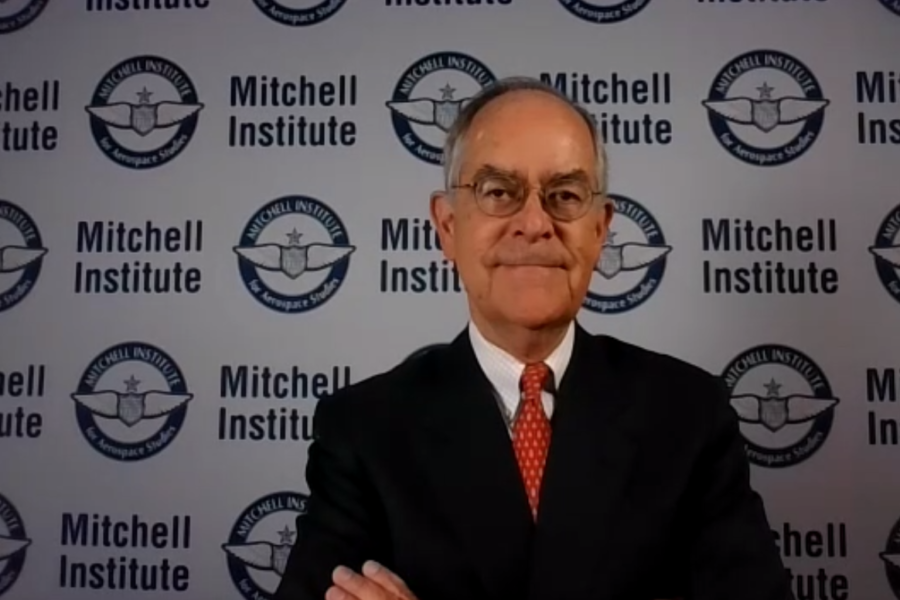For years, Rep. Jim Cooper (D-Tenn.) has been one of Congress’ leading voices when it comes to space as a warfighting domain and the creation of the Space Force.
Now, with less than a year left before he leaves the House, Cooper warns that the new service is at risk of being “stifled” by bureaucracy, outdated thinking—and the Air Force.
Speaking at a virtual Schriever Spacepower Forum hosted by AFA’s Mitchell Institute for Aerospace Studies, Cooper offered a candid assessment of the challenges he sees facing the Pentagon and the Space Force as they look to ensure U.S. space superiority. It’s something the veteran lawmaker has done before, pushing for faster, bolder development.
“I kind of view myself as the guardian of the Guardians, because I’m so proud of the Space Force being stood up. I’m so proud of Space Command,” Cooper said. “I think [Chief of Space Operations Gen. John W. “Jay” Raymond] and [SPACECOM commander Gen. James H. Dickinson] are doing an awesome job. But it’s still in its infancy. And I’m worried about the Air Force trying to exert too much control and in some cases to stifle the development of the Space Force. Because I think the future is unlimited. We know that the universe is unlimited. And we have to have not only the best capability, but by far the best capability to make sure that we achieve our national goals and really for the benefit of the entire planet.”
As part of the Space Force’s formation, it was organized under the Department of the Air Force and has been closely linked with the Air Force ever since—thousands of Guardians are former Airmen; the Air Force provides support personnel; and leaders have highlighted the two services’ “intertwined” nature. Air Force Secretary Frank Kendall has repeated the mantra of “one team, one fight.”
But Cooper, who announced in January that he wasn’t seeking reelection in 2022, sounded a note of caution against the Space Force tying itself too closely to the Air Force, instead advocating for USSF to eventually become “fully independent.”
Such a move would seemingly contradict comments made by Kendall. In a speech at the annual Space Symposium this April, Kendall warned against focusing on space as an “independent warfighting domain” and urged the Space Force to instead direct its attention to providing services such as communications and surveillance to the other armed services.
“They worried me at the time—they worry me now,” Cooper said of Kendall’s comments. “Because it could all be benign and benevolent, but with the history we have with the Air Force and the difficult birthing process of the Space Force, I’m worried. We need to make sure that the mother doesn’t stifle the child here. One day, the Space Force will be fully independent. I look forward to that day. In the meantime, we need to make sure that old Air Force thinking, which was even resistant to drones and certainly wasn’t fond of the Space Force, [doesn’t dominate].”
Cooper is not the first lawmaker to express skepticism toward the Air Force’s relationship with the Space Force. In 2019, Rep. Mike Rogers (R-Ala.) claimed that the Air Force had actually posed the biggest obstacle to even establishing the Space Force.
But it’s not just USAF that could potentially hold the Space Force back, Cooper said. In recent months, lawmakers and officials have tangled over the formation of a Space National Guard, a debate that Cooper argued threatens to overshadow the main issue.
“We’ve got to look at value added—what really works,” Cooper said. “And in highly technical areas like space, you know, it’s amazing what new personnel designs we should be able to come up with. Because you might want to have Active-duty people who are part time, because if you’re a smart software engineer out on the West Coast or have other unique skills, you might be able to be a weekend warrior. You might be able to contribute in lots of ways, maybe Guard, maybe Reserve, maybe Active duty. We may need a whole new concept, because while these super-smart people have long hair and tattoos and nose rings and all sorts of crazy stuff that isn’t traditional military, we need the best talent that the nation can offer.”
In at least some regards, the Space Force and Cooper are aligned—the service has proposed a hybrid personnel structure of full- and part-time Guardians called the “Space Component,” an approach that would be unique among the military services.
There are still other challenges to consider, though, not the least of which is the Pentagon’s massive bureaucracy. Cooper noted that one of his biggest concerns is speed of acquisition, a frequent source of frustration for many in Congress and DOD that has persisted for decades now.
Indeed, while the Space Force was intended to centralize and lead the military’s space efforts, the bureaucracy may be no better, Cooper said. In the past, “the Pentagon had 60 naysayers to disapprove of any satellite and hardly anyone who could give approval, even the [Defense Secretary]. So that’s a crazy situation. And it’s actually one that I’m still worried about right now, that we may even have more naysayers today with a Space Force and Space Command than we did before it was stood up.”
Against all these challenges to progress, Cooper insisted that “we can meet and beat this.” But it will require a lot, he warned.
“It’s going to take new thinking, and sometimes we think too much in the old way. It would be a disaster if Space Force becomes TRANSCOM. We’ve got to be much bolder than that. Space is its own warfighting domain,” Cooper said.

